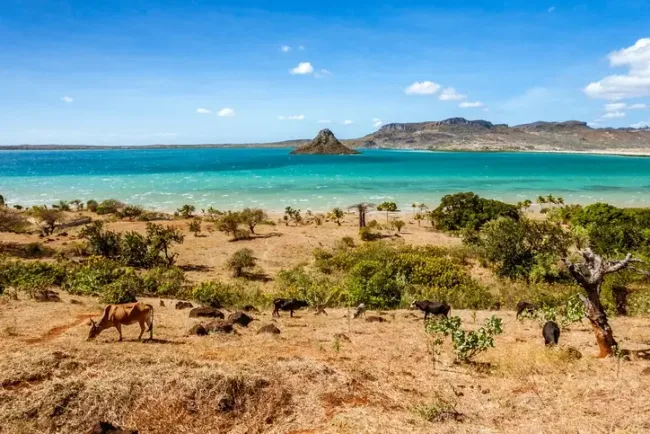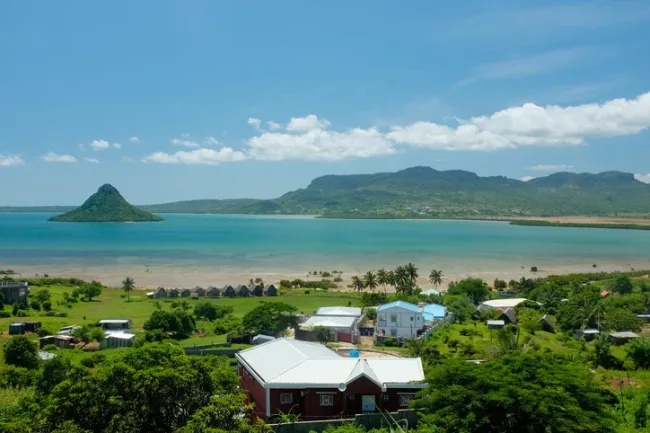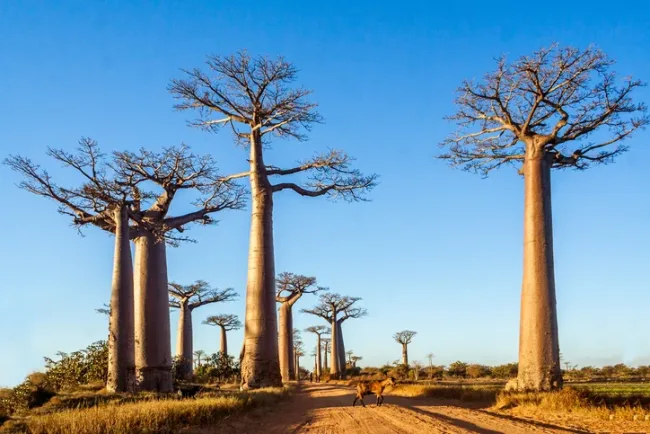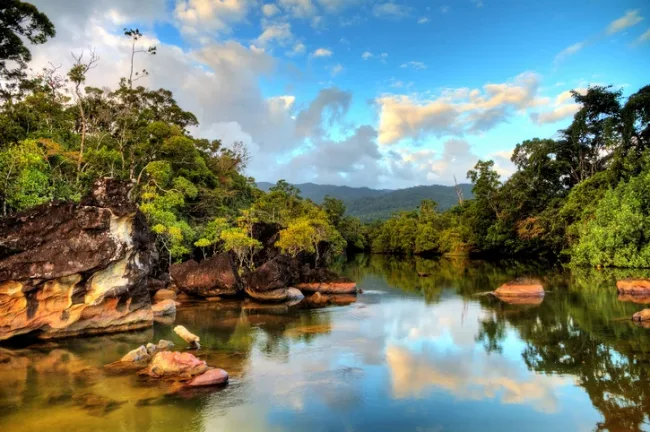
Welcome to Madagascar
Wondering if you need a visa for Madagascar? Look no further. This blog will guide you through whether you require a visa and help you pick the right one based on why you're traveling. With us, applying for a visa becomes less of a chore, allowing you to concentrate on planning your trip or adventure in Madagascar.

What's a Madagascar eVisa, and who's it for?
Who's the Madagascar eVisa for?
All foreign visitors who are not Malagasy citizens need to apply for a Madagascar eVisa.
What's the purpose of the Madagascar eVisa?
This visa facilitates the entry process for tourism and short-term visits, including sightseeing, visiting friends or relatives, or engaging in leisure activities.
How long can you stay with a Madagascar eVisa?
Madagascar offers eVisas for varying lengths of stay, allowing for a maximum duration of up to 60 days Per Entry for a Single Entry. However, it's possible to extend this period to 90 days once you're in the country.
Learn more about the Madagascar eVisa.
What's a Madagascar Business Visa, and who's it for?
Who's the Madagascar Business Visa for?
The Madagascar Business Visa is tailor-made for business people, professionals, or investors heading to Madagascar for business-related activities.
What's the purpose of the Madagascar Business Visa?
-
Attendance at business meetings, conferences, and exhibitions.
-
Negotiations and contract signings with local partners.
-
Investment opportunities, either in new ventures or existing businesses.
How long can you stay with a Madagascar Business Visa?
The business visa for Madagascar is valid for up to 90 days, offering single-entry access. However, multiple-entry visas might sometimes be granted, allowing several visits within a year.
What's a Madagascar Medical Visa, and who's it for?
Who's the Madagascar Medical Visa for?
Individuals seeking medical treatment in Madagascar. This could include a wide range of medical services, from elective procedures to more urgent health care needs.
What's the purpose of the Madagascar Medical Visa?
-
Access to medical procedures.
-
Treatment in Madagascar's medical facilities for specific health conditions.
-
Recovery and rehabilitation in a conducive environment.
How long can you stay with a Madagascar Medical Visa?
The visa length generally aligns with the treatment period, including pre-treatment consultations and post-treatment recovery.
What are the Malagasy long-term visa options, and who are they for?

Madagascar provides various long-term visas or permits for those planning to stay beyond 90 days, catering to different purposes.
To obtain a long-term visa, applicants must first secure a one-month visa, extendable and transformable to a long-term visa through a Malagasy embassy. Afterward, in Madagascar, they need to apply for a long-term visa and a resident card at the Ministry of the Interior.
Some of the more popular long-term visa options include:
-
Investment Visa: For individuals investing in the Malagasy economy through business ventures or other significant investments.
-
Work Visa: Aimed at professionals with job offers in Madagascar, facilitating employment and contribution to the local economy.
-
Study Visa: For international students enrolled in educational programs within Madagascar, promoting cultural exchange and education.
-
Family Reunification Visa: Allows family members of legal residents or citizens to join them in Madagascar.
-
Retirement Visa: For retirees seeking to spend their retirement in Madagascar.
-
Missionary/Religious Work Visa: For those undertaking religious or missionary work, supporting spiritual and community services.
We currently don't handle these long-term visa applications. For detailed information, requirements, and application processes for long-term stays in Madagascar, please visit the Madagascar Ministry of Foreign Affairs website.
Staying healthy in Madagascar: Here's what you need to know
Preparing your health for a trip to Madagascar is crucial for a seamless and enjoyable experience. Here's what you need to know about staying healthy, with a focus on necessary vaccinations and precautions.
Make sure to stay updated on routine vaccines
Ensure you're up to date with routine shots such as measles-mumps-rubella (MMR), diphtheria-tetanus-pertussis, varicella (chickenpox), polio, and your yearly flu shot.
Recommended vaccinations for visitors include:
-
Hepatitis A: Advised for most travelers, especially those visiting rural areas or smaller towns.
-
Hepatitis B: Suggested for travelers under 60 who haven't been vaccinated.
-
Malaria: Travelers going to certain areas of Madagascar will need to take prescription medicine to prevent malaria. Depending on the medicine you take, you'll need to start taking this medicine multiple days before your trip, as well as during and after your trip.
-
Polio: Adults who've been vaccinated should get a booster, and those who haven't should complete the vaccination series before traveling.
-
Yellow fever: You must have a vaccination certificate if coming from countries with a risk of yellow fever.
-
Typhoid: Recommended for travelers visiting smaller cities, rural areas, or staying with friends and relatives.
-
Measles: Infants aged 6 to 11 months should receive an MMR dose before travel.
-
Rabies: Recommended for those spending significant time outdoors, in rural areas, or in close contact with wildlife.
-
Consult your airline or the nearest Malagasy embassy or consulate to stay updated on Madagascar's COVID-19 travel regulations, including quarantine, testing, or vaccine documentation.
Medical facilities
Madagascar provides both public and private healthcare facilities. You'll find that medical services are particularly advanced in larger cities like Antananarivo. However, the available medical facilities might be limited in more remote areas.
-
For complex medical procedures, patients might be transported to Mauritius, South Africa, or Réunion.
-
International visitors and those needing specialized care often choose private healthcare due to its wider range of services and specialist access.
-
Pharmacies are readily available in urban areas and offer a variety of over-the-counter medicines. If you need specific prescription medication, it's best to carry your own.
Health insurance
Before heading off on your journey, secure comprehensive travel insurance.
Getting treated at private clinics or hospitals can get expensive. You'll want to check that your insurance can handle big bills, especially if you need an emergency flight home.
Make sure your insurance covers you well, including:
-
Compensation for travel-related issues such as cancellations, delays, or disruptions.
-
Coverage for medical treatments and potential evacuations.
-
Reimbursement for lost baggage.
Things to be aware of when visiting Madagascar

Madagascar is a welcoming destination for visitors, but it's wise to be mindful of certain health precautions.
-
Altitude sickness: When exploring mountainous regions above 8,200 feet (2,500 meters), be aware of the possibility of altitude sickness. Symptoms should be taken seriously—don't ascend further and consider descending if conditions worsen.
-
Insect bite prevention: With diseases like Dengue fever and chikungunya present, safeguard yourself with DEET or Picaridin-based repellents, wear protective clothing, and stay in places with air conditioning or screens.
-
Food and water safety: Stick to bottled water and be careful when eating raw or not fully cooked foods to avoid getting sick.
-
Natural disasters: The cyclone season runs from November to April. Keep up with weather updates on the Meteo Madagascar website and follow the advice and instructions of local authorities.
-
Beach safety: It's better to avoid going to remote beaches by yourself. If you're unsure about a place, ask locals or a travel guide for advice.
-
Observe local laws and customs: In many parts of the country, local traditions and rules, or "fady," are important to follow. If you're visiting rural areas, ask a guide or locals about the dos and don'ts to show respect.
Medication for personal use
If you're packing medication for your trip to Madagascar, here's what you need to remember:
-
Declare all medications: Make sure to inform customs about any medicine you're bringing in, especially if it's something you need a prescription for or is a controlled substance.
-
Keep medicine in its original packaging: All medicine should stay in the packaging it came in, with the label with your name and prescription.
-
Have a prescription or doctor's note: You should also have a letter from your doctor or a recent prescription explaining why you need the medicine.
-
Check for restrictions: It's a good idea to check with the nearest embassy or consulate of Madagascar to make sure your medicine isn't banned or restricted there.
-
Pack only what you need: Bring enough medicine for your trip to avoid hassle.
Need embassy support?
To get information on getting a visa for Madagascar or if you need other services from the consulate, the best thing to do is contact the Malagasy embassy or consulate in your home country.
And if you need help while you're in Madagascar, the embassy or consulate from your country is there to support you. You can find the nearest one by using our Embassies Finder.

 India Visa
India Visa
 Turkey Visa
Turkey Visa
 United States Visa
United States Visa
 Australia Visa
Australia Visa
 Colombia Visa
Colombia Visa
 New Zealand Visa
New Zealand Visa
 China Visa
China Visa
 Egypt Visa
Egypt Visa
 Vietnam Visa
Vietnam Visa
 Indonesia Visa
Indonesia Visa
 UK Passport Renewal
UK Passport Renewal
 CA Passport Renewal
CA Passport Renewal
 IE Passport Renewal
IE Passport Renewal

